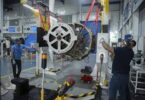Monitoring Desk
NEW YORK: The Bush Institute WE Lead Scholars work together during the training hosted by CIPE.
As women in the Middle East and North Africa lead efforts to advance economic opportunity in their countries, developing a greater understanding of economic reform to promote free markets through improved skills in advocacy becomes vital to their success. To support these efforts, the Center for International Private Enterprise (CIPE) partnered with the George Bush Institute’s WE Lead program from March 13 – 15, to offer training workshops, facilitate practical exercises, and foster debate on the foundations of free market systems and the role of the private sector and civil society in shaping economic opportunity.
Lili Sisombat of the World Bank
The workshop, held in CIPE’s Washington, DC headquarters, brought together 16 WE Lead Scholars from Afghanistan, Egypt, Lebanon, Jordan, and Tunisia. The WE Lead Scholars work in a variety of fields; CIPE’s training was designed to provide the Scholars with tools to engage with institutional barriers to economic empowerment, advocacy and women’s leadership in varied contexts. The first component of the curriculum, led by Kim Bettcher, Director of Knowledge Management at CIPE, examined economic inclusion, and the relationship of the private sector to governance. Bettcher drew on existing scholarly literature on theoretical and practical approaches to these issues. This sparked a fruitful exchange about why things work the way they do in the participants’ countries and globally, including a lively discussion about informality and the benefits of moving informal economic activity into the formal sector in the Middle East and North Africa (MENA) region. For one of the sessions, Bettcher was joined by Senior Program Officer at the World Bank, Lili Sisombat, who discussed the value and process of public-private dialogue.
WE Lead Scholars interacting during the advocacy training session led by CIPE’s Pamela Beecroft.
During the second part of the training, CIPE Senior Program Officer Pamela Beecroft delivered an advocacy training that taught participants about the advocacy cycle and applied it to problems they identified. Through these sessions, CIPE sought to address the challenges and opportunities for women’s economic empowerment identified by the Scholars. These included: how women are present and active but rarely ultimate decision-makers; how there are often barriers to female entrepreneurs obtaining funding; as well as how advocates can be role models and use success stories as “proof” to change prevailing mindsets.
During their time at CIPE, some Scholars discussed their Personal Leadership Project (PLP) with CIPE staff and the ways in which some of these projects overlap with CIPE’s work in the MENA region. One of the Scholars, Sarina Faizy, who is a Provincial Council Member in Kandahar, Afghanistan is working on increasing employment opportunities for women and gender equality in the workplace in a post-conflict context. She discussed the challenges of being a woman council member and ways in which the Pashtun culture and the Taliban insurgency create obstacles for advancing women’s rights in her province. Despite those barriers, she’s looking forward to going back to Afghanistan and applying some of the tools and knowledge that she’s learned via both CIPE and the Bush Institute to continue advocating for women’s rights.
Isabelle Mahnke, CIPE Program Assistant for MENA, highlights key points during the introductory training session.
The Scholars reported feeling challenged and inspired by the curriculum. Some participants expressed interest in reading more about the different roles of institutions, while others were intrigued by learning about the role of the private sector in policy and the challenge of bringing informal businesses into the formal economy. Many expressed that Beecroft’s training in the practical application of advocacy skills would serve them well in their work. Although many have previously used the tools for advocacy that Beecroft discussed, this curriculum will help them to apply those tools in a systematic manner, which is a critical skill for advocacy in closed political spaces. It is equally important for controversial topics like equal inheritance rights, access to finance and property rights or other issues related to women’s empowerment in the MENA region.
CIPE’s program included CIPE Board Member and Small Business and Entrepreneurship (SBE) Council President and CEO Karen Kerrigan, and Alexandria Chamber of Commerce Chief Operating Officer and Vice President of Public Policy Maria Ciarrocchi as keynote speakers. Both discussions highlighted the culture of business advocacy in the United States, demonstrating how collective action from the private sector can identify solutions to economic priorities in a cooperative partnership with government. The Scholars noted that Kerrigan inspired them to, “…not wait for an opportunity, but to create their own opportunity.” Ciarrocchi spoke about her extensive work in advocacy towards local government—a topic that intersects with much of the Scholars’ own work. Additionally, as a special highlight to their program, CIPE arranged a meeting for the Scholars with U.S. Chamber of Commerce Senior Executive Vice President Suzanne Clark, who discussed her role as a female leader involved in high-stakes decision-making. Additionally, CIPE’s Center for Women’s Economic Empowerment (CWEE) views the partnership with the Bush Institute’s WE Lead program as critical for women’s economic leadership in MENA and was proud to support networking efforts for the Scholars during their time in Washington, DC.
As the Scholars return home and employ the knowledge and skills gained during the program, both CWEE and CIPE’s MENA team will reengage and support their initiatives. While some of the Scholars are directly involved in advocacy, many work in different fields. However, the lessons on economic reform, and the strategies for strengthening personal leadership will inform their work and help them to strengthen their impact in their chosen fields.
Courtesy: (cipe.org)






